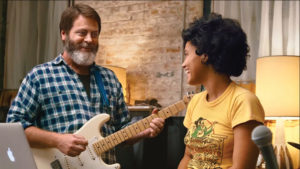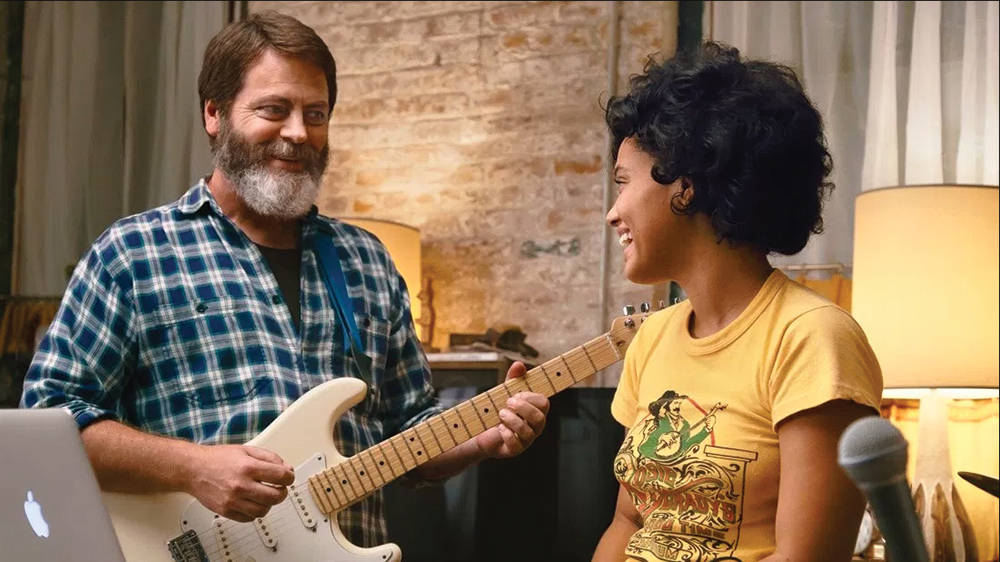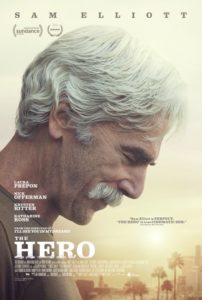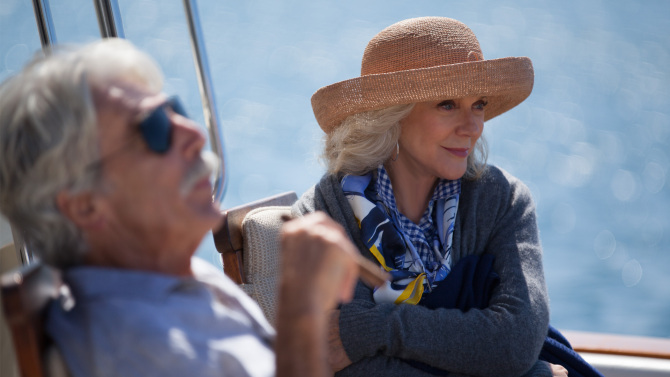Hearts Beat Loud
Posted on June 7, 2018 at 5:12 pm
B +| Lowest Recommended Age: | High School |
| MPAA Rating: | Rated PG-13 for some drug references and brief language |
| Profanity: | Brief strong language |
| Alcohol/ Drugs: | Alcohol, references to drug use, scenes in a bar |
| Violence/ Scariness: | Family and economic struggles, absent parent |
| Diversity Issues: | Divers characters |
| Date Released to Theaters: | June 8, 2018 |
| Date Released to DVD: | September 10, 2018 |

Isn’t it nice that we get to go live in Brett Haley World every now and then? The gifted young writer-director of “I’ll See You in My Dreams” and “Hero” always gives us characters who might be flawed, who might not be where they expected or wanted or deserved to be, but who are marvelously human and endearing. His latest is “Hearts Beat Loud,” the story of a single dad with a failing business (vinyl records) and a bright, beautiful daughter about to leave for college. It is nothing less than high praise to say these are nice people. We love spending time with them. One reason is that Haley writes roles that great actors want to play, and he creates a space for them to do their best.
An early scene is not the usual father-daughter dispute. The daughter is Sam (Kiersey Clemons), a high school senior planning to be a doctor, and she wants to study to get ready for pre-med courses about the human heart. Her father, Frank Fisher (Nick Offerman), wants to entice her away from her studies for “a jam sesh.” She is not interested. He wants them to be a band and asks her to name it. “We are not a band,” she says. “We Are Not a Band” it becomes, a Schrodinger’s Cat of a name that is both true and not true. Frank impulsively uploads Sam’s song to Spotify. Some attention to the song makes Frank think that they — maybe she — could have the chance he always dreamed of.
Is Sam a kid who had to be the grown-up in the relationship because her father never got over his dream of music? Well, maybe a little bit, but In Haley’s films, nothing is ever simple or formulaic. Sam respects and loves her dad, and even shares his love for music. She understands why he wants her to play with him. They won’t have many opportunities to do things together when she leaves. It is the prospect of her leaving that makes strengthening that bond even more important, though they both understand that having lived away from home will change everything between them, even when she comes back. There is another reason Frank wants to spend more time with Sam in the place that means the most to him, though he may not recognize it consciously at first. He gets to a point, though, where he asks: “Is there a girl? Or a boy?”
It is a girl. Sam is in love with Rose (Sasha Lane), an endearingly sweet first love. The mutual support and respect between the two girls is beautifully portrayed.
Sam has a mother who needs more support (“I’ll See You in My Dreams” star Blythe Danner) and he has a landlady (Toni Collette) who is almost a member of the family. When he tells her he can no longer pay even the discounted rent she generously allows him, she does everything she can to find a way to keep him there because she cares about him and she knows he cares about the store. She knows he cares about her, too, but she is in a relationship. And Sam has a buddy, a pot-smoking bartender played by Ted Danson (nice to see him behind a bar again).
Every performance in the film is a quiet gem. Offerman, so good at comic bombast in “Parks and Rec”is even better in a role that is not heightened but natural and understated. Frank is holding in a lot of his feelings, partly because he does not want Sam to see him worry about the store, his mother, or getting on after she leaves. But Offerman lets us see all of that and more, and he never for a moment lets us think that Frank is or thinks of himself as a loser. Clemons is a real find, radiant and completely believable as the braniac future doctor, the smokin’ singer, and the girl on the brink of first-time teenage love. Danson and Collette settle into their roles with infinite grace. The music in the film is fine. The music of the film sings straight to the heart.
Parents should know that this movie has references to pot smoking, some drinking, non-explicit teen sex, references to loss, and brief strong language.
Family discussion: What would you name your band? Did Frank make the right decision? What will happen next?
If you like this, try: “Danny Collins” and “Janie Jones”




